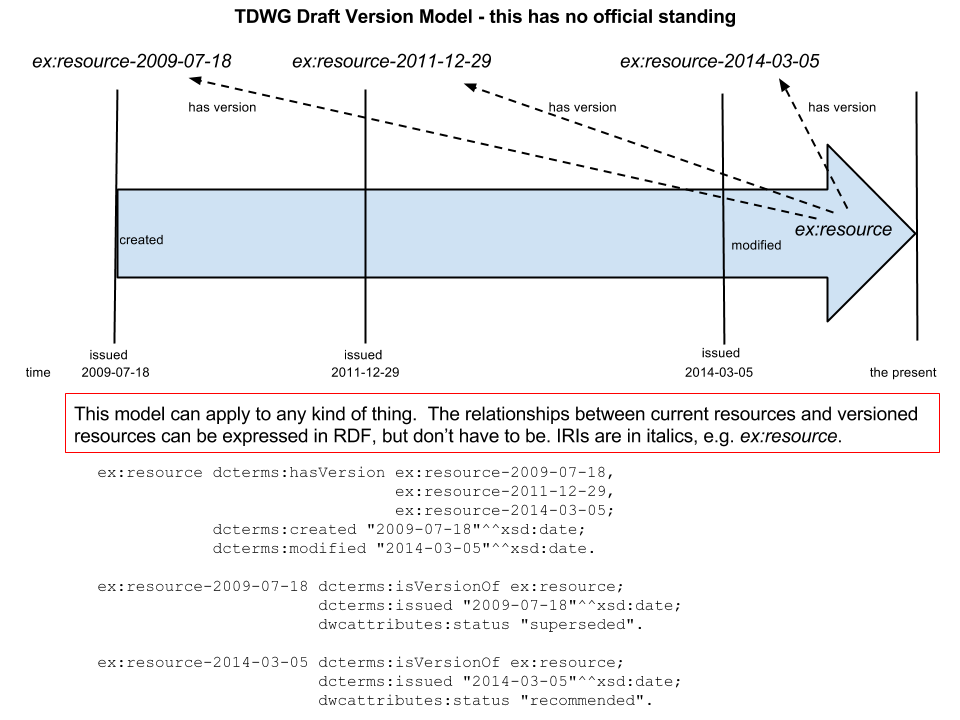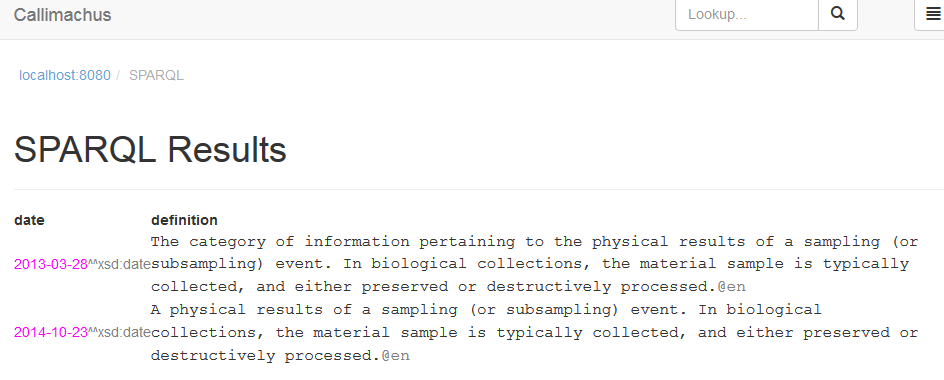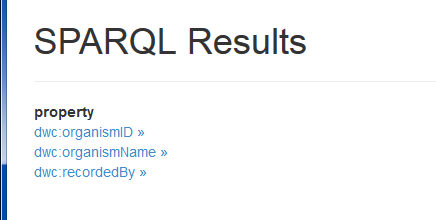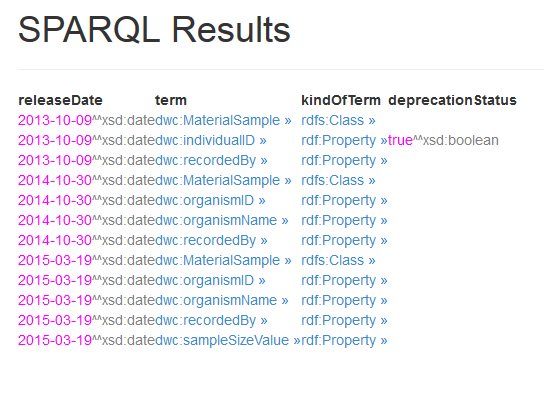#TDWG Version Model Preliminary Draft 2015-07-15 - Steve Baskauf - TDWG Vocabulary Management Task Group
Note: This document has no official standing. It is subject to change at any time and should not be considered to be stable nor citable. Versioned term URIs and dwcattributes:status values of versioned terms reflect current Darwin Core practice and would be extended to all TDWG vocabularies.
##Definitions Current resource - a resource in its current state. A current resource is identified by the permanent IRI of the resource.
<< Is there a better term than "current" for this? John W. suggests "latest".>>
Example:
dwc:recordedBy (http://rs.tdwg.org/dwc/terms/recordedBy)
Versioned resource - a version of a resource at some particular time. The latest version of a resource will have the same properties as its corresponding current resource except for properties that relate it to the current resource and other related versioned resources. The normal convention is to append the value of dcterms:issued (in form of the xsd:date datatype) to the local name of the IRI, although there may be circumstances where this is not possible nor desirable. Clients should not parse the IRI to discover the date of issue; rather they should retrieve the value of dcterms:issued.
Example:
dwc:recordedBy-2014-10-23 (http://rs.tdwg.org/dwc/terms/recordedBy-2014-10-23)##Property relationships
A current resource is linked to a versioned resource by the property dcterms:hasVersion. A versioned resource is linked to its current resource by the property dcterms:isVersionOf. Note: DCMI does not explicitly declare that dcterms:hasVersion owl:inverseOf dcterms:isVersionOf. So unless this is declared and reasoning is performed, both of these relationships between current and versioned resources will exist only if both kinds of triples are explicitly declared.
Examples:
dwc:recordedBy dcterms:hasVersion dwc:recordedBy-2014-10-23.
dwc:recordedBy-2014-10-23 dcterms:isVersionOf dwc:recordedBy.A versioned resource is related to a previous version by the property dcterms:replaces. A versioned resource is related to a subsequent version by the property dcterms:isReplacedBy. Note: DCMI does not explicitly declare that dcterms:replaces owl:inverseOf dcterms:isReplacedBy with the same implications as above.
Examples:
dwc:recordedBy-2014-10-23 dcterms:replaces dwc:recordedBy-2009-04-24.
dwc:recordedBy-2009-04-24 dcterms:isReplacedBy dwc:recordedBy-2014-10-23.A versioned resource is linked to another related versioned resource by the same property that links its corresponding current resource to the corresponding related current resource.
Example:
If
dwc:recordedBy rdfs:isDefinedBy <http://rs.tdwg.org/dwc/terms/>.then
dwc:recordedBy-2014-10-23 rdfs:isDefinedBy <http://rs.tdwg.org/dwc/terms-2014-10-23>.A versioned resource may have multiple values if it is related to several versioned related resources.
Example:
dwc:recordedBy-2014-10-23 rdfs:isDefinedBy <http://rs.tdwg.org/dwc/terms-2014-10-23>;
rdfs:isDefinedBy <http://rs.tdwg.org/dwc/terms-2015-03-19>.The publication date for a versioned resource is designated by the property dcterms:issued. The modified date of a current resource is designated by the property dcterms:modified; its value will be the same as the dcterms:issued property of its most recent corresponding versioned resource.
Example:
dwc:recordedBy dcterms:modified "2014-10-23"^^xsd:date;
dcterms:hasVersion dwc:recordedBy-2014-10-23, dwc:recordedBy-2009-04-24.
dwc:recordedBy-2014-10-23 dcterms:issued "2014-10-23"^^xsd:date;
dcterms:replaces dwc:recordedBy-2009-04-24.
dwc:recordedBy-2009-04-24 dcterms:issued "2009-04-24"^^xsd:date.##Status of current terms and versioned terms
Current terms are either in use or deprecated. A deprecated current term has an owl:deprecated property with a boolean value of "true". For example:
dwc:individualID owl:deprecated "true"^^xsd:boolean.Any current term without an owl:deprecated property can be assumed to be in use. Current terms never "go away" - they should persist so that a client dereferencing an obsolete term IRI can "follow its nose" and discover that use of the term should be discontinued.
Versioned terms have a status of recommended, superseded, or deprecated. A recommended version of a term has a dwcattributes:staus value of "recommended". A superseded version of a term has a dwcattributes:staus value of "superseded". A version of a term that is deprecated has a dwcattributes:staus value of "deprecated". For example:
<http://rs.tdwg.org/dwc/terms/recordedBy-2014-10-23> dwcattributes:staus "recommended"^^xsd:string.
<http://rs.tdwg.org/dwc/terms/recordedBy-2009-04-24> dwcattributes:staus "superseded"^^xsd:string.
<http://rs.tdwg.org/dwc/terms/individualID-2009-04-24> dwcattributes:staus "deprecated"^^xsd:string.A current term that is in use should have only one version with a recommended status (the most recent one) and one-to-many versions with superseded status. A current term that is deprecated should have no versions with recommended status, zero-to-many versions with superseded status, and one version with deprecated status (the most recent one).
A versioned term may replace or be replaced by another versioned term. A current term that is in use may replace a deprecated current term, in which case the deprecated current term will be replaced by the current term that is in use. However, a deprecated current term will not necessarily be replaced by any current term.
Examples: A current term in use replaces deprecated current terms.
<http://rs.tdwg.org/dwc/dwcore/Collector> owl:deprecated "true"^^xsd:boolean.
<http://digir.net/schema/conceptual/darwin/2003/1.0/Collector> owl:deprecated "true"^^xsd:boolean.
dwc:recordedBy dcterms:replaces <http://rs.tdwg.org/dwc/dwcore/Collector>.
dwc:recordedBy dcterms:replaces <http://digir.net/schema/conceptual/darwin/2003/1.0/Collector>.Statuses of versioned terms. Note that only one version of recordedBy is recommended and that no versions of Collector are recommended since the current term Collector is deprecated.
<http://rs.tdwg.org/dwc/terms/recordedBy-2014-10-23> dwcattributes:status "recommended"^^xsd:string.
<http://rs.tdwg.org/dwc/terms/recordedBy-2009-04-24> dwcattributes:status "superseded"^^xsd:string.
<http://rs.tdwg.org/dwc/terms/recordedBy-2008-11-19> dwcattributes:status "superseded"^^xsd:string.
<http://rs.tdwg.org/dwc/terms/Collector-2007-04-17> dwcattributes:status "deprecated"^^xsd:string.
Versioned terms that replace or are replaced by other versions.
<http://rs.tdwg.org/dwc/terms/recordedBy-2014-10-23> dcterms:replaces <http://rs.tdwg.org/dwc/terms/recordedBy-2009-04-24>;
dcterms:isVersionOf dwc:recordedBy.
<http://rs.tdwg.org/dwc/terms/recordedBy-2009-04-24> dcterms:replaces <http://rs.tdwg.org/dwc/terms/recordedBy-2008-11-19>;
dcterms:isVersionOf dwc:recordedBy.
<http://rs.tdwg.org/dwc/terms/recordedBy-2008-11-19> dcterms:replaces <http://rs.tdwg.org/dwc/terms/Collector-2007-04-17>;
dcterms:isVersionOf dwc:recordedBy.
<http://rs.tdwg.org/dwc/terms/Collector-2007-04-17> dcterms:isVersionOf <http://rs.tdwg.org/dwc/dwcore/Collector>.The following SPARQL queries show how this model enables reconstruction of the state of a current resource at particular times in the past. The screenshots show what happens when the query is run on the Ontology Vocabulary sample file
Display the definitions of all versions of the term dwc:MaterialSample and the date that each definition was adopted.
SELECT ?date ?definition WHERE {
dwc:MaterialSample dcterms:hasVersion ?version.
?version dcterms:issued ?date.
?version rdfs:comment ?definition.
}List all properties that were in the 2014-10-30 release of the Darwin Core current dwc: terms list.
SELECT ?property WHERE {
<http://rs.tdwg.org/dwc/terms/> dcterms:hasVersion ?listVersion.
?listVersion dcterms:issued "2014-10-30"^^xsd:date.
?listVersion dcterms:hasPart ?termVersion.
?property dcterms:hasVersion ?termVersion.
?property a rdf:Property.
}List Darwin Core current terms version release dates, the terms on each list, the type of term, and current deprecation status.
SELECT ?releaseDate ?term ?kindOfTerm ?deprecationStatus WHERE {
<http://rs.tdwg.org/dwc/terms/> dcterms:hasVersion ?listVersion.
?listVersion dcterms:issued ?releaseDate.
?listVersion dcterms:hasPart ?termVersion.
?term dcterms:hasVersion ?termVersion.
OPTIONAL { ?term owl:deprecated ?deprecationStatus. }
?term a ?kindOfTerm.
}Construct a graph that contains properties of all terms that were in the 2014-10-30 release of the Darwin Core current dwc: terms list. (note: sample data set doesn't have all of these properties, so I haven't tried this)
CONSTRUCT {
?term rdfs:label ?labelObject.
?term rdfs:comment ?commentObject.
?term dcterms:description ?descriptionObject.
?term rdfs:isDefinedBy <http://rs.tdwg.org/dwc/terms/>.
?term dcterms:modified ?modifiedObject.
?term a ?typeObject.
... [continue with remaining properties]
}
WHERE {
<http://rs.tdwg.org/dwc/terms/> dcterms:hasVersion ?listVersion.
?listVersion dcterms:issued "2014-10-30"^^xsd:date.
?listVersion dcterms:hasPart ?termVersion.
?termVersion rdfs:label ?labelObject.
?termVersion rdfs:comment ?commentObject.
OPTIONAL { ?termVersion dcterms:description ?descriptionObject. }
?termVersion dcterms:issued ?modifiedObject.
?termVersion a ?typeObject.
... [continue with additional properties]
?term dcterms:hasVersion ?termVersion.
}Note: If the triple pattern for a particular property is not satisfied, this query will fail for that particular term. For example, dwc:accordingTo does not have a dcterms:description property and would be missed. The solution is to replace the simple dcterms:description triple pattern with
OPTIONAL { ?termVersion dcterms:description ?descriptionObject. }as shown in the example.
The point is that this system would allow a semantic client to reconstruct the state of a current resource (such as the Darwin Core term list) at any point in time by extracting saved data about its corresponding versioned resource at that time.



